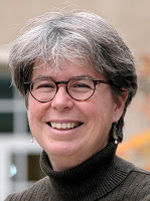I reached into the refrigerator and pulled out a stick of butter to make mashed potatoes for dinner on Sunday. With a sinking heart, I realized it was soft, too soft. Our refrigerator, which has helped us keep the kids fed from toddlers to teens, decided it had had enough and wheezed to a stop, ironically enough on Mother’s Day. Thankfully amid the end of semester chaos we hadn’t had time to grocery shop, so little was lost beyond a couple of quarts of milk.
Chatting with my youngest, still away at school, I mentioned he would come home to find a new refrigerator in the kitchen. He was worried about losing more than the milk, “SAVE THE CLIPPINGS!” he pleaded.
I assured him I would, and on Thursday carefully took down the list of household rules, the cartoons clipped from the paper about math and music and growing up, the AP scores, the photos and the postcard with the Benedictus on it, brought back from Jerusalem by one of Mike’s friends for me.
[hotblock]
I carefully saved the magnets with their helpful — and occasionally snarky — advice: What was stuck to our refrigerator, though seemingly a random collection of yellowed clippings, old photos and the odd form, in truth revealed much of who we are as a family, reminding me of joys and sorrows.
It made me think about sacred Scripture, itself an eclectic collection of family stories, poems, proverbs. Reminders of joys and sorrows, all part of the story of who we are as the People of God, all pointing to the food within, God’s word made flesh.
Guigo, a 12th century Carthusian monk and the prior of the Grande Chartreuse monastery, wrote a letter to a friend describing the practice of lectio divina, a way to let Scripture feed us. He framed the practice as four steps — reading, meditating, praying and contemplating — framing them as a meal.
“Reading,” said Guigo, “puts as it were whole food into your mouth; meditation chews it and breaks it down; prayer finds its savor; contemplation is the sweetness that so delights and strengthens.”
This year marks the 50th anniversary of Dei Verbum, Vatican II’s dogmatic constitution on divine revelation, which ends by encouraging everyone to dig into the feast set forth for us in the Scriptures, not just reading the Word, but digging into it, savoring it and allowing it to build up the Body of Christ. We should be, says Dei Verbum, penetrated by the Scriptures.
It can be hard to decide where to start, which book, which Testament, even which translation. One place might be with the Scripture readings for Sunday Mass. My pastor has been urging us all to prayerfully reflect on the Gospel for the coming Sunday; one could as easily pick the psalm, or one of the two other readings.
As with any meal, be careful not to bite off more than one can chew. Learn, as a wise Jesuit once told me, to linger with delight on a single line of Scripture, to seek within for what God has set out for us, to feed our hungers, to strengthen our souls. To so penetrate our lives, that we are radiant with the joy of the Gospel.
Resources:
A short lesson in lectio divina from the Carmelites.
The readings for each day from the United States Conference of Catholic Bishops.
***
Michelle Francl-Donnay is a member of Our Lady of Good Counsel Parish, Bryn Mawr.
PREVIOUS: What would it take for a divorcee to become Catholic?
NEXT: Pope Francis urges reflection on ‘final farewell’ from earthly life




Share this story